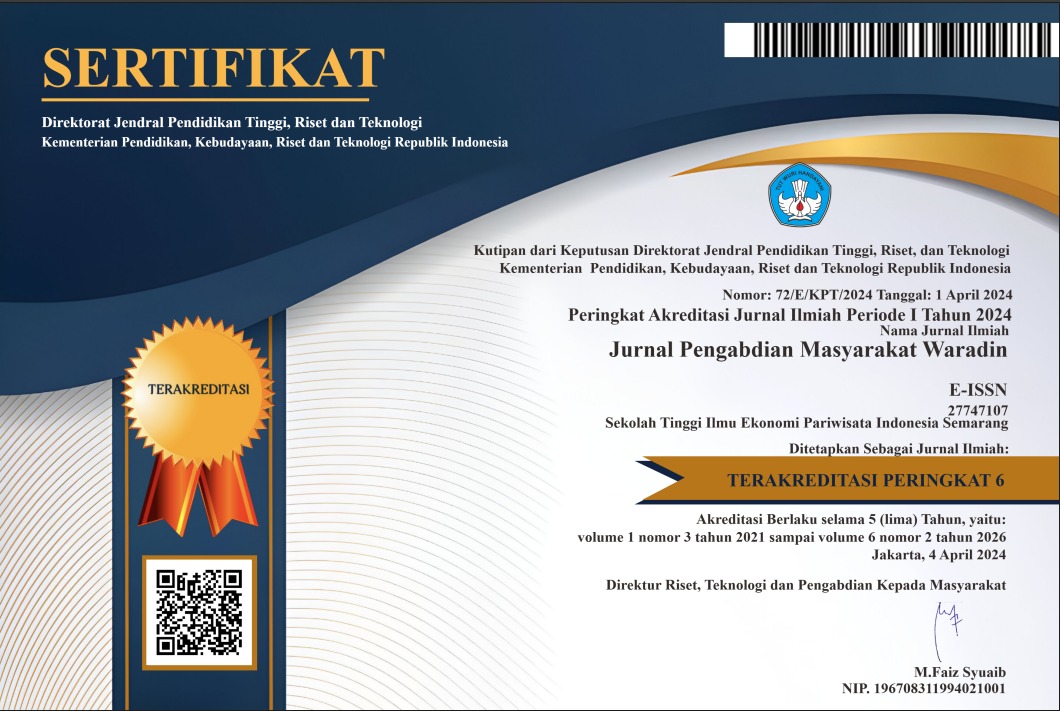Sosialisasi Pengkajian Dampak Ekonomi Semarang Great Sale 2024 Dalam Pemberian Diskon Pajak Kepada Pelaku Usaha
DOI:
https://doi.org/10.56910/wrd.v4i3.394Keywords:
Semarang Great Sale, Tax discounts, Community service, Local economy, Semarang City GovernmentAbstract
Semarang Great Sale (Semargres) is an annual event held by the Semarang City Government and the Semarang City Chamber of Commerce and Industry (KADIN) from 2010 to 2023. This event aims to strengthen relations between Semarang City business actors, including the hotel sector, shopping centers, souvenir producers, retail traders, MSMEs, SMEs, and street vendors. Semargres 2024 will be held from August to early September 2024, with the closing at Queen City Mall Semarang on September 2, 2024. As support, the Semarang City Government and the hotel, restaurant, and entertainment sectors provide a 20% tax break to eligible Semargres participants based on November 2023 taxes and compensated for December 2023 taxes. The Lecturer Team of the Faculty of Economics and Business, Dian Nuswantoro University, implements this community service program in collaboration with KADIN and the Semarang City Government through the Regional Revenue Agency. This program aims to socialize the study of the results of the implementation of Semargres 2024 as a basis for providing tax discounts. This activity is expected to increase the understanding of business actors about the benefits and mechanisms of providing tax discounts, encourage their active participation in Semargres in the future, and be a reference for the development of the local economy of Semarang City.
References
Badan Pusat Statistik (BPS). (2023). Laporan tahunan pembangunan Kota Semarang. Badan Pusat Statistik.
Barro, R. J., & Sala-i-Martin, X. (2004). Economic growth. MIT Press.
Dinas Pariwisata Kota Semarang. (2024). Laporan statistik pariwisata Kota Semarang. Pemerintah Kota Semarang.
Dinas Perindustrian dan Perdagangan Kota Semarang. (2024). Semarang Great Sale: Laporan dampak ekonomi 2024. Pemerintah Kota Semarang.
Hadi, A. (2022). Pendekatan riset partisipatif dalam pengabdian masyarakat. Jurnal Pengabdian Masyarakat, 10(2), 123–135.
Jati, R. (2024). Tahapan kegiatan pengabdian masyarakat: Evaluasi dan tindak lanjut. Jurnal Pembangunan Sosial, 15(1), 56–72.
Jha, R., Singh, R., & Sharma, P. (2020). The impact of fiscal incentives on economic growth. Journal of Economic Policy, 18(3), 235–250.
Kementerian Perindustrian (Kemenperin). (2024). Perkembangan kawasan industri di Kota Semarang. Kementerian Perindustrian RI.
Kusnadi, T., & Arif, M. (2023). Agenda dan pelaksanaan sosialisasi dalam program pengabdian. Jurnal Manajemen Komunitas, 12(4), 89–101.
Mahendra, S. (2024). Analisis dampak kebijakan fiskal terhadap PAD. Jurnal Ekonomi Daerah, 8(3), 142–157.
Ostrom, E. (1990). Governing the commons: The evolution of institutions for collective action. Cambridge University Press.
Rahayu, N. (2022). Peran Kadin dan Bapenda dalam pengelolaan event ekonomi. Jurnal Administrasi Publik, 11(2), 98–110.
Sari, D., & Rini, W. (2023). Metode sosialisasi dan audiensi dalam pengabdian masyarakat. Jurnal Komunikasi Pembangunan, 14(1), 45–59.
Setiawan, B. (2023). Kebijakan keringanan pajak dalam pembangunan ekonomi daerah. Jurnal Fiskal dan Ekonomi, 9(2), 76–88.
Stiglitz, J. E. (2010). Freefall: America, free markets, and the sinking of the world economy. W.W. Norton & Company.
Thaler, R. H., & Sunstein, C. R. (2008). Nudge: Improving decisions about health, wealth, and happiness. Yale University Press.
Wulandari, L. (2024). Partisipasi aktif dalam perencanaan pengabdian masyarakat. Jurnal Pengembangan Masyarakat, 13(1), 32–47.







